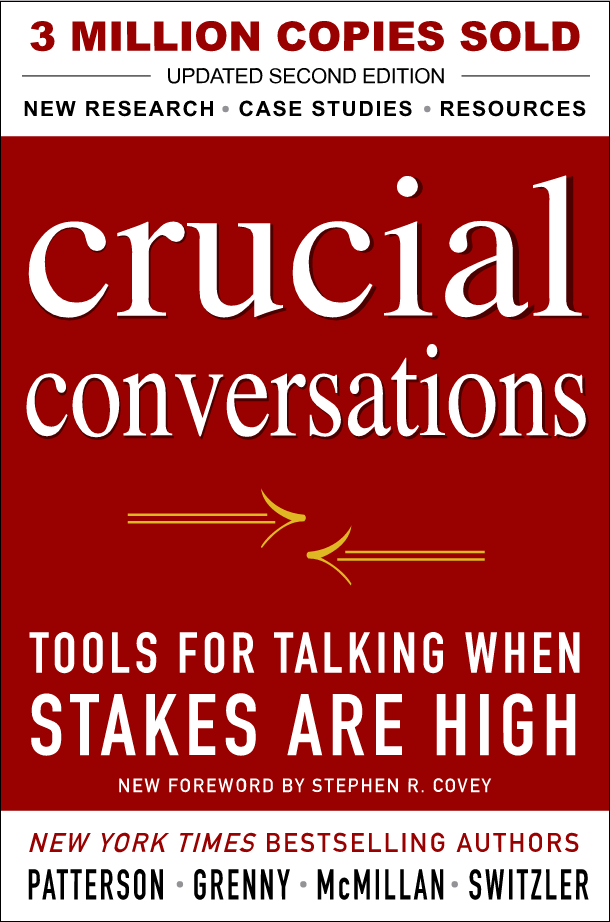What We're Reading Now
The First Book You Should Read This Year
6 January 2017
Eden read Crucial Conversations and realized how much of what makes conversations difficult happens before we even open our mouths.
Tags: books, communication, crucial conversations, eden read, new year’s resolutions, thoughtful candor
When I started at Allison Partners in July of 2016, I asked if there were any resources that I should read as a part of my onboarding. I was quickly pointed to our copy of Crucial Conversations. Not only is it on our reading list of all-time favorites, but it’s also about a topic that impacts, well, just about everything. You probably don’t have to look back too far to remember the last conversation you had that did not go as planned. In fact, after observing people for 25 years, the authors of Crucial Conversations came to the frustrating conclusion: “When conversations matter the most…we’re generally on our worst behavior.” Why is that? And if we can identify what’s going on behind the scenes, is there something we can do to get better results? Crucial Conversations helps you answer these questions for yourself by addressing your mindset before you enter a conversation and then by giving you tools to navigate and maintain dialogue once your conversation starts.
I decided to write about just two of the many tools included in Crucial Conversations, but that is only a fraction of the book itself that contains many more suggestions and practices than one blog post can address. As I read through the chapters, I found myself revisiting old conversations over and over again. I thought about the motives behind my actions and what I could have done differently. It’s easy to believe that some people are simply gifted in dialogue and some people just aren’t. I always put myself into the latter category, but I am learning that many of my successes and failures when it comes to communication have less to do with my ability and more to do with my mindset before I even speak.

Since we have control over half of the conversation, the authors suggest you prepare by challenging your mindset. One story we tell ourselves that is detrimental to creating a safe space for dialogue is what the authors call the “sucker’s choice.” It is the belief that we have to choose between hurting someone’s feelings and not saying anything at all. In other words, we assume that if we are honest someone will get hurt. This belief can give us anxiety about a conversation and lead us to avoid confrontation altogether. On the other hand, this belief can lead us to set an extremely low standard for how thoughtful we need to be when addressing sensitive topics, resulting in a self-fulfilling prophecy. A useful tool to combat this belief is the authors’ use of the word “and.” What if you can bring up an uncomfortable issue and stay good friends with someone? What if you can state your disagreement and still make your family member feel respected? Refusing to fall for the “sucker’s choice” sets a higher standard for what you can accomplish in your conversations and leads to more creative solutions for you and the people in your life.
Navigating conversations can be tricky once you engage in dialogue, especially when you or the other person is feeling “angry, scared, or hurt.” Crucial Conversations offers a framework to help you keep your dialogue on track in the heat of the moment. Even though emotions seem like instant reactions to the actions of others, there is an intermediate step that is often overlooked: storytelling. The authors write, “Emotions don’t just happen...you and only you create your emotions.” This means that when we think we are reacting to the actions of others, we are really reacting to the stories we tell ourselves about the intentions of others. Crucial Conversations helps you to recognize and slow down this process so that you can catch yourself before you assume the worst about somebody else.
Most of us don’t go into conversations planning to heighten emotions without solving the issue at hand. However, without the right tools there is often a short amount of time between bringing up a touchy subject and being met with anger, hurt feelings, or defensiveness. If you’ve been looking for a way to have meaningful dialogue about difficult topics, I think reading Crucial Conversations in the beginning of the new year would be a wonderful place to start.







Comments
Our Comment Policy:
Our blog posts are only half of the conversation. What our readers have to say is equally important to us, and we're grateful for all the comments that continue the dialog.
To ensure that the discussion here is as useful as possible to all of our readers, please be respectful of our contributors and refrain from harassing, threatening and/or vulgar language. We reserve the right to screen and remove any comments from the site. If you have a question about a comment or want to discuss our policy, please contact us. We'll talk it over.
There are no comments for this entry yet.